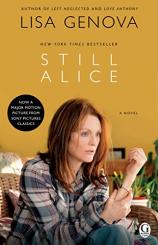Still Alice
Review
Still Alice
In this powerful debut novel, Alice Howland is a 50-year-old cognitive professor at Harvard and a world-renowned linguistics expert. One day while out jogging, she finds herself lost in Harvard Square unable to find her way home, though she is just a mile from her house on a route she has traveled every day. This is just one of the memory disturbances that she has noted she is having on an ongoing basis. Soon she can tell that these moments, which are coming with increased frequency, are not ordinary --- and they are disturbing.
Trying to figure out what is going on, Alice does a quick Google search for “menopause symptoms” and quickly sees that scattered thinking and memory lapses may be caused by a lack of estrogen. She notes to schedule a doctor appointment and shuts down the computer, thinking she has this solved with some relief that there can be a quick fix. Alice is used to confronting problems just like this: identify the problem and find the solution.
But somehow it feels like this might be something a bit more. While she muddles on trying to keep her life on course, the fractures and fissures in her memory become more real. In one chapter, she stands before her class to give the lecture she just spent 45 minutes preparing for and realizes she cannot recall the topic she has prepped to deliver. An eager student answers her question about the subject from the syllabus, and she proceeds with the lecture. Thinking that the day is on course, she gets home and is relaxing when her husband comes in and asks, “Aren’t you supposed to be in Chicago?” She had completely forgotten a business trip.
Though the idea frightens her, she knows this issue of her memory is far deeper than menopause and asks her gynecologist for a reference to a neurologist. After appointments and tests, she comes to realize that the diagnosis is far more dire than she thought, and it will not be cured with a few hormone pills: she has early-onset Alzheimer’s disease. She is told she needs to bring someone to her appointments lest she not capture all the details of what is being shared with her. She also is told that she may not be the best judge of her own limitations and that someone other than her should fill out the paperwork on the state of her mind. Her world starts spiraling around her.
Struggling with these ideas, Alice fights these thoughts, not wanting to accept that she is losing control of her life. She thinks of filling in the paperwork on her own and shows up at meetings alone as her doctor chastises her for this. Suddenly, in a moment that she has not planned, her story tumbles out as she tells her husband John what has been going on. He is stunned for a moment and then recalls a party where it was clear she was not connecting on what was going on. He knows in a moment that life has changed with those two words, Alzheimer’s disease, but also recognizes like a smack to the head that the world shifted a while back but he just chose to ignore it.
The disease progresses swiftly, leaving Alice and her family struggling with an unraveling of the world that they have come to know. Where she was the anchor who held the family secure, she now must lean on her husband and three children to keep her safe. They need to pull the threads of her life together. They need to know where to find her when she does not even know she has become lost.
In due course she must give up her work, which is closure on a particular thing she loves, a piece of the world that defines her. At the same time, John is offered opportunities that he feels he must take, which again remind her what she is losing. Frustrations build, and the tensions that were bubbling beneath the surface rise quickly. The emotions that swirl through these pages will tug at readers as they identify with Alice and her struggles. For Alice, the simplest pleasures like jogging and cooking become chores that need assistance. For a woman who valued her independence, her dependence now is palpable.
Alice is bright enough to know that the end here is not going to be pretty, but she fights to keep control of her world, grappling for control as long as she can. In what becomes a ritual for her, she answers five simple questions on her BlackBerry each day. In answering these questions, she reassures herself that things are still status quo. But as the reader watches, a word changes in her standard simple replies, followed by the phrasing, and then the correct answer becomes completely muddled; while she feels the answers are right, we see she is losing her grasp. When the day finally dawns that she cannot even understand the questions, let alone give the answers, Alice moves to the next step that she has noted on her BlackBerry --- one that she wrote herself directions for back when things just had started to dim. She goes to her computer and finds the file called “Butterfly” and follows the instructions there.
STILL ALICE has an authentic voice and a pitch-perfect tone even as Alice loses control of her own words. Lisa Genova, the author, is a trained neuroscientist who understands the science behind Alzheimer’s from a clinical point of view, but she also comprehends the personal tragedy that accompanies one losing a loved one who is standing beside them as her grandmother suffered through Alzheimer's. Told through Alice’s lens, the book has a personal feeling to it that could not have happened as well in third person. I know what Alzheimer’s is, but this story gave me a lot more insight into exactly what it feels like. While I have a better understanding of friends who are coping with their parents’ travails with the disease, reading Alice’s story where the disease struck someone so young made me want to live life and enjoy it with renewed gusto since I saw just how fragile the line between whole and broken can be.
In case you cannot figure this out, STILL ALICE grabbed me from the first page. I kept reading knowing I was not going to get much done until I finished it; I kept saying one more page, one more chapter, until the book was completed. A friend was traveling with me a few months ago and showed up late to cocktails. She walked in apologizing and saying, “I just could not put down the book I was reading.” When I asked what it was, she told me it was STILL ALICE. We started talking about it since we both had the same reaction. And I have thought of this story over and over these past months.
There's something else to note about this book. It's being simultaneously released in hardcover and trade paperback, a very smart move by the publisher, ensuring the opportunity to get this title into as many readers’ hands as possible, no matter what format you prefer. Both versions have a reader’s guide and an interview with Genova that gives terrific background to the book. STILL ALICE will prompt conversation; it’s a perfect book club book. I dare you to finish this novel and not turn to someone to talk about it.
Reviewed by Carol Fitzgerald on January 23, 2011
Still Alice
- Publication Date: December 2, 2014
- Genres: Fiction
- Paperback: 352 pages
- Publisher: Gallery Books
- ISBN-10: 1501106422
- ISBN-13: 9781501106422





